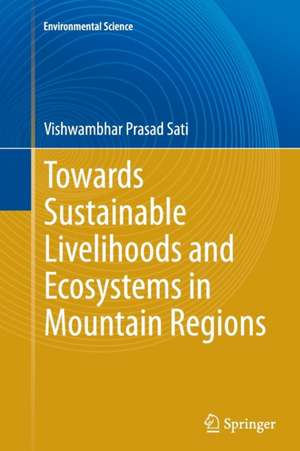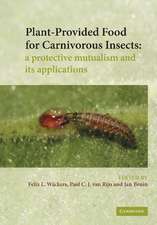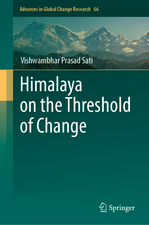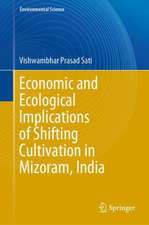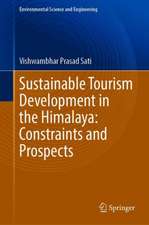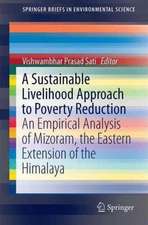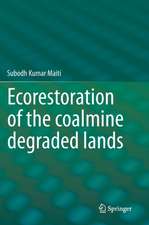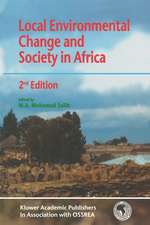Towards Sustainable Livelihoods and Ecosystems in Mountain Regions: Environmental Science and Engineering
Autor Vishwambhar Prasad Satien Limba Engleză Paperback – 27 aug 2016
| Toate formatele și edițiile | Preț | Express |
|---|---|---|
| Paperback (1) | 636.80 lei 6-8 săpt. | |
| Springer International Publishing – 27 aug 2016 | 636.80 lei 6-8 săpt. | |
| Hardback (1) | 643.00 lei 6-8 săpt. | |
| Springer International Publishing – 10 ian 2014 | 643.00 lei 6-8 săpt. |
Din seria Environmental Science and Engineering
- 18%
 Preț: 1238.42 lei
Preț: 1238.42 lei - 18%
 Preț: 2166.68 lei
Preț: 2166.68 lei - 18%
 Preț: 1420.88 lei
Preț: 1420.88 lei - 18%
 Preț: 914.20 lei
Preț: 914.20 lei - 18%
 Preț: 1225.94 lei
Preț: 1225.94 lei - 18%
 Preț: 1118.13 lei
Preț: 1118.13 lei - 18%
 Preț: 1402.74 lei
Preț: 1402.74 lei - 18%
 Preț: 3419.93 lei
Preț: 3419.93 lei - 18%
 Preț: 1223.55 lei
Preț: 1223.55 lei - 18%
 Preț: 1008.91 lei
Preț: 1008.91 lei - 18%
 Preț: 1234.46 lei
Preț: 1234.46 lei - 18%
 Preț: 1409.82 lei
Preț: 1409.82 lei - 18%
 Preț: 736.64 lei
Preț: 736.64 lei - 18%
 Preț: 949.73 lei
Preț: 949.73 lei - 18%
 Preț: 1287.47 lei
Preț: 1287.47 lei - 18%
 Preț: 2116.64 lei
Preț: 2116.64 lei - 18%
 Preț: 1231.95 lei
Preț: 1231.95 lei - 15%
 Preț: 641.71 lei
Preț: 641.71 lei - 23%
 Preț: 1129.32 lei
Preț: 1129.32 lei - 18%
 Preț: 1237.93 lei
Preț: 1237.93 lei - 18%
 Preț: 956.18 lei
Preț: 956.18 lei - 24%
 Preț: 1057.94 lei
Preț: 1057.94 lei - 24%
 Preț: 1079.09 lei
Preț: 1079.09 lei - 18%
 Preț: 953.03 lei
Preț: 953.03 lei - 18%
 Preț: 1233.06 lei
Preț: 1233.06 lei - 15%
 Preț: 666.73 lei
Preț: 666.73 lei - 18%
 Preț: 1222.31 lei
Preț: 1222.31 lei - 18%
 Preț: 1242.35 lei
Preț: 1242.35 lei - 18%
 Preț: 1232.89 lei
Preț: 1232.89 lei - 18%
 Preț: 1823.56 lei
Preț: 1823.56 lei - 18%
 Preț: 1228.96 lei
Preț: 1228.96 lei - 18%
 Preț: 1221.69 lei
Preț: 1221.69 lei - 18%
 Preț: 945.79 lei
Preț: 945.79 lei - 18%
 Preț: 1008.28 lei
Preț: 1008.28 lei - 24%
 Preț: 795.50 lei
Preț: 795.50 lei - 18%
 Preț: 1246.47 lei
Preț: 1246.47 lei - 18%
 Preț: 1239.85 lei
Preț: 1239.85 lei - 18%
 Preț: 957.62 lei
Preț: 957.62 lei - 18%
 Preț: 1244.89 lei
Preț: 1244.89 lei - 15%
 Preț: 640.55 lei
Preț: 640.55 lei - 18%
 Preț: 950.33 lei
Preț: 950.33 lei - 18%
 Preț: 1824.01 lei
Preț: 1824.01 lei - 15%
 Preț: 639.59 lei
Preț: 639.59 lei - 18%
 Preț: 947.50 lei
Preț: 947.50 lei - 18%
 Preț: 951.29 lei
Preț: 951.29 lei - 18%
 Preț: 1229.73 lei
Preț: 1229.73 lei
Preț: 636.80 lei
Preț vechi: 749.19 lei
-15% Nou
Puncte Express: 955
Preț estimativ în valută:
121.87€ • 126.76$ • 100.61£
121.87€ • 126.76$ • 100.61£
Carte tipărită la comandă
Livrare economică 14-28 aprilie
Preluare comenzi: 021 569.72.76
Specificații
ISBN-13: 9783319354064
ISBN-10: 331935406X
Pagini: 221
Ilustrații: XVI, 205 p. 54 illus., 41 illus. in color.
Dimensiuni: 155 x 235 x 12 mm
Greutate: 0.32 kg
Ediția:Softcover reprint of the original 1st ed. 2014
Editura: Springer International Publishing
Colecția Springer
Seriile Environmental Science and Engineering, Environmental Science
Locul publicării:Cham, Switzerland
ISBN-10: 331935406X
Pagini: 221
Ilustrații: XVI, 205 p. 54 illus., 41 illus. in color.
Dimensiuni: 155 x 235 x 12 mm
Greutate: 0.32 kg
Ediția:Softcover reprint of the original 1st ed. 2014
Editura: Springer International Publishing
Colecția Springer
Seriile Environmental Science and Engineering, Environmental Science
Locul publicării:Cham, Switzerland
Cuprins
Geo-Environmental Setting.- Socio-Economy and Population Profile.- Sustainable Livelihoods: Diversification and Enhancement.- Livelihood Analysis.- Development of Tourism and Hydroelectricity.- Case Studies.- Mountain Ecosystem.- Sustainable Mountain Development: Challenges and Opportunities.
Textul de pe ultima copertă
Sustainable livelihoods and ecosystems are far-reaching and burning issues in the wake of high growth of population, low production and per ha yield of crops and depletion of biodiversity resources. Mountainous regions of the world are facing the menace of poverty, food insecurity and malnutrition. Further, tremendous growth in population and slow pace of development have together forced most of the population to live below poverty line. Traditionally depending upon cultivating subsistence crops for food requirement, the people living in mountainous region are unable to produce sufficient food grains to run their livelihood smoothly. The Himalayas is one of the world’s biodiversity hotspots and has an abundance of natural resources: land, water and forest – life sustaining factors. The geo-environmental conditions – climate and landscape further enhance the possibility of sustainable livelihoods through eco-tourism, harnessing water resources and utilizing forests and their products sustainably. Diversifying agricultural practices through cultivating cash and cereal crops and enhancing livelihood options through extensive use of timber and non-timber based forestry products can help to eradicate poverty and provide food security. This book consists of an introduction and nine chapters, covering geo-environmental setting, socio-economy and population profile, sustainable livelihoods: diversification and enhancement, livelihood analysis, development of tourism and hydroelectricity, case studies, mountain ecosystems, sustainable mountain development and also presents a conclusion.
Caracteristici
Unique in terms of enhancing livelihoods in the mountain region in general and the Himalaya mountains in particular No similar work on this issue in the Himalayan region Gives a comprehensive picture of the Indian Central Himalayan Region and its livelihood enhancement. It is a valuable resource for all stakeholders working for the provision of sustainable livelihood in the Himalayas Includes supplementary material: sn.pub/extras
